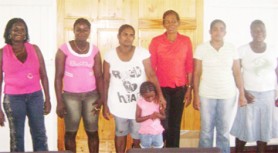A group of women from Mahdia in Region Eight (Potaro/Siparuni) which functions under the name ’Women on the Move’, will benefit from training in the operation of machinery such as bulldozers and bobcats through funding from the Canadian International Development Agency (CIDA).
Scientific consultant attached to CIDA, Richard Couture, who also heads the Guyana Environmental Capacity Building Project (GENCAPD), speaking at a meeting with the group at the Mahdia Regional Office on Tuesday afternoon, stated that the $3.3M grant which was approved by CIDA to assist the group, is part of the economic aspect of GENCAPD’s programme which he said is to assist persons in mining communities. He said the group submitted a proposal to CIDA, requesting assistance in the provision of training in the use of heavy-duty vehicles.
Noting that it is a cultural norm in Guyana of not seeing women participating in such activities, Couture stated that the proposal was “curious” but CIDA decided to go ahead and assist the women even though it was seen as risky. He said, however, the group’s proposal was seen as having the potential to succeed and the training of the women in Georgetown was initially brought to the fore but consideration had to be given to members of the group who have children to care for. He said the project is one of six small grant projects facilitated by CIDA. Monies expended by the group will be audited to ensure their goals are accomplished.

Organizing secretary of Women on the Move, Grace Urquhart, who is also a Regional Democratic Councillor at Mahdia, speaking on the formation of the group, stated that the general lack of opportunities in the mining community inspired the group members to consider something exceptional, making a breakthrough for Guyanese women in general. Urquhart, who said she had been a miner in the early part of her life for a number of years, added that she, like other group members who were present at Tuesday afternoon’s forum, was proud that their proposal was selected. In addition, she said that the members of the group will add a variety of proposals to their list of activities which she said could assist in generating an income for each member’s household.
One such activity which the group intends to pursue is the making of clay blocks since Urguhart noted that clay is readily available at Mahdia and it would cut costs as a substitute for traditional building materials such as cement and timber. Another group member noted that clay blocks are widely used in sections of Region 9 communities in the construction of homes.
The group plans to get in touch with the Institute of Applied Science and Technology (IAST) at Turkeyen on the East Coast of Demerara to obtain technical support as well as any other form of assistance. Couture noted that the women’s group could also approach CIDA for assistance.
The 15–member group which has been in existence some five months now has no age limit attached to membership.
Training is expected to commence next month in the operation of the heavy-duty machinery and while it has not been confirmed what particular type of vehicle the women will be trained to operate initially, Couture told the group that they may be trained to drive a small vehicle such as a car, before upgrading to the bobcat and bulldozer among other heavy-duty vehicles.
The communities in the Mahdia area revolve around gold mining, with the men partaking in the search for the precious metal on a daily basis as the women stay at home and look after the younger ones.
According to ‘Women on the Move’ the limited job opportunities available to women in the area, such as food vending and domestic work, has forced them to take this step forward.





